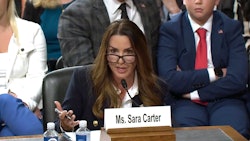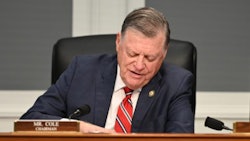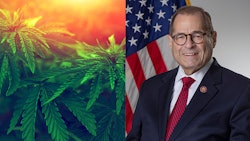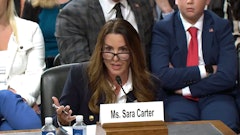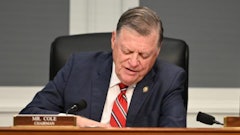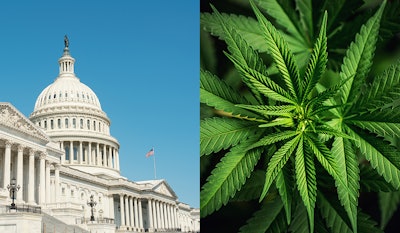
“The next few weeks,” in President Donald Trump’s words, is starting to look more like a few months, or longer, as a cannabis rescheduling decision remains strapped in the backseat of a now broken-down federal government.
It’s been more than seven weeks since Trump told reporters on Aug. 11 that his administration would “make a determination” to reclassify cannabis from a Schedule I to Schedule III drug under the Controlled Substances Act.
But the president won’t be chanting, “Promise made, promise kept,” on his now elapsed timeline, as the cannabis reform movement remains a low priority among elected officials after Trump and Congress failed to avert a government shutdown on Oct. 1. While Republicans control Congress, the finger-pointing was quick to come from both sides of the aisle, as it takes two to tango on a federal spending deal.
In a White House press release issued Wednesday, the Trump administration blamed Democrats, saying the shutdown was “engineered by the radical left lunatics who control their party,” and that “Republicans will not be held hostage by this unserious, shameful political gamesmanship by Democrats.”
The deadlock in Washington comes 254 days into Trump’s term. The last government shutdown, which lasted 35 days, also happened on Trump’s watch in December 2018 and January 2019, costing the United States roughly $3 billion in GDP that was never regained, according to the Congressional Budget Office.
During a press briefing on Oct. 1, White House Press Secretary Karoline Leavitt said federal government layoffs are “imminent.”
Meanwhile, Senate Minority Leader Chuck Schumer, D-N.Y., told MSNBC that Republicans in Congress attempted to “bludgeon us” instead of working on a compromise over divisive issues, such as health care policy.
“We want to sit down and negotiate a good deal that protects Americans from the health care crisis, and we’re ready to do that right away,” he said. “The bottom line is that we’ve been trying to sit down with them for months … because we needed to work this out in a bipartisan way. When I was majority leader, we negotiated 13 bills – no shutdowns – because we sat down with the Republicans in each case. And they got something; we got something. The only reason we’re at this thing is they thought they could bludgeon us without even one bit of consultation.”
Each day spent, or not spent, sitting down to come to an agreement on must-pass legislation, such as appropriation bills to fund the federal government, is a day lawmakers lose out on nonessential legislation, such as cannabis reform.
Stakeholders in the cannabis industry know this reality all too well.
For instance, Schumer had 15 months to call the Secure and Fair Enforcement Regulation (SAFER) Banking Act to a floor vote following the Senate Banking Committee’s bipartisan passage of the bill in September 2023. The former majority leader even promised in March 2024 to “turn” to the legislation soon, adding, “We first have to fund the government.”
Even after the government was funded, Schumer never brought the legislation – to provide safe harbor to financial institutions wishing to service the cannabis industry – to a floor vote despite having the likely votes to do so.
On a similar note, President Joe Biden’s administration had 27 months to reclassify cannabis after he directed the U.S. Department of Health and Human Services in October 2022 to conduct an administrative process to review how the plant is scheduled.
Cannabis banking legislation or a Schedule III relisting would positively impact the industry’s financial sector, from access to traditional financial services to a company’s ability to deduct ordinary business expenses from its federal taxes, respectively.
On the other hand, the government shutdown’s implications are “immediate and deeply disruptive” to the cannabis industry, Safe Harbor Financial CEO Terry Mendez said. Safe Harbor is a cannabis-exclusive financial platform that works with state-sanctioned cannabis companies.
“A government shutdown risks freezing the already slow gears of federal regulatory progress,” he said in a statement provided to Cannabis Business Times. “Every delay at agencies like the DEA or FDA reverberates across our ecosystem, such as slowing scientific reviews, halting public comment windows, and pushing back the timeline for long-overdue rescheduling. The broader, more systemic risk is to investor confidence, borrower confidence, and even the confidence of banks that are already cautious about serving cannabis-related businesses.”
As cannabis businesses continue to navigate razor-thin margins in often overregulated and overtaxed state markets, as well as the federal tax burdens tied to Schedule I drugs under Section 280E of the Internal Revenue Code, dysfunction in Washington is a setback that industry participants cannot afford, Mendez said.
“We urge lawmakers to avoid unnecessary disruptions that stall momentum in one of the nation’s fastest-growing and most innovative industries,” he said. “This is not just about cannabis; it’s about small business stability, financial inclusion, and a maturing regulatory system that deserves consistency, not chaos.”
The potential effects of the government shutdown include about 750,000 employees who could be furloughed, according to the Congressional Budget Office.
As politics often drive much of the focus in Washington, the consequences for an industry that has already been unfairly marginalized by federal policy are often overlooked, NewLake Capital Partners CEO Anthony Coniglio said. NewLake provides real estate capital to state-licensed cannabis operators.
“A shutdown would not only halt critical functions across federal agencies but also stall the long-awaited progress on cannabis rescheduling efforts,” Coniglio said in a statement provided to CBT. “The 450,000 Americans employed in the state-legal cannabis industry are counting on this reform, and it is deeply concerning that political brinkmanship is being prioritized over meaningful progress. Using a shutdown as a political tool ignores the very real impact on hardworking Americans whose livelihoods depend on fair and timely government action.”
Although the shutdown will draw Trump’s attention away from his rescheduling decision, nothing is stopping the president from charting a path forward once Congress sends him a bill to restore government funding. He’s free to make an announcement anytime he wants.












